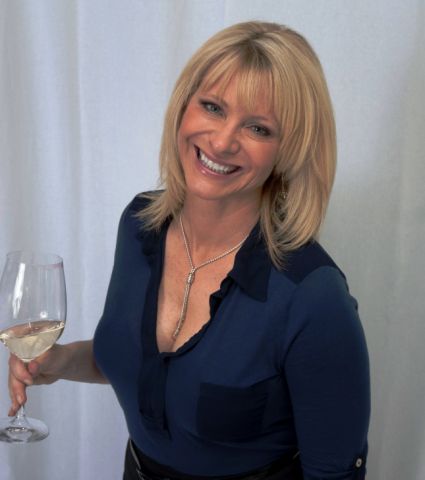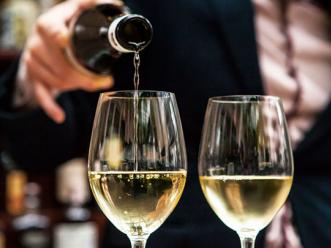 Leslie Sbrocco is an award-winning author, speaker, wine consultant, and the author of two national wine books. As host of the PBS series Check Please!, she has won a coveted James Beard award, two Tasty Awards, and three Emmy awards. Sbrocco was also a featured judge on the PBS national series, The Winemakers, and she is a regular guest on NBC’s Today Show. She is also a wine educator for Crystal Cruises and Holland America Cruise Lines, and has started a new venture, Thirsty Girl, which aims to empower women in their wine and food choices.
Leslie Sbrocco is an award-winning author, speaker, wine consultant, and the author of two national wine books. As host of the PBS series Check Please!, she has won a coveted James Beard award, two Tasty Awards, and three Emmy awards. Sbrocco was also a featured judge on the PBS national series, The Winemakers, and she is a regular guest on NBC’s Today Show. She is also a wine educator for Crystal Cruises and Holland America Cruise Lines, and has started a new venture, Thirsty Girl, which aims to empower women in their wine and food choices.
With your books, Emmy winning TV shows, and high profile articles in publications like O, Good Housekeeping and Glamour, what are you hoping to accomplish for the American wine buying public?
To make wine a part of everyday life. We're already getting there as is evidenced by the recent study showing we're the largest wine consuming nation in the world. Through communicating about wine in a fun and unpretentious way, it makes people feel comfortable ordering, buying and enjoying wine. My goal would be to have a bottle on every dinner table in the country.
With the wine industry saturated with magazines, blogs, books and websites, what do you see as the future of wine journalism?
There will always be a need for credible voices with a point of view, but the power of consumers' voices has grown exponentially stronger through social media. I don't think we'll ever see another powerhouse expert like Robert Parker though. Recommendations from friends has always been a top driver of sales (especially with women and younger drinkers) and now with wine lovers embracing social media/mobile tools in record numbers their behavior is changing the way we buy wine.
Rising wine alcohol levels in U.S. and foreign wines are a hot topic these days in wine circles. What are your thoughts on the subject?
I think the trend of uber-ripeness and overly alcoholic wines might be peaking. Just as we saw a decade ago when "oaky butter bomb" Chardonnays were all the rage and now elegant versions are gaining traction, wine styles are cyclical. To me greatness in wine is about balance. If you have a warm climate and it produces wines of power, that's fine as long as all the pieces work together (acid, oak, alcohol, tannins) to find harmony.
What wine varieties would you like to see the public embrace more fully?
Riesling from Germany, Australia, and Washington State. Roses (dry) from Spain and Italy. Torrontes from Argentina; Grenache from California's cooler areas, and finally fortified wines. I adore Port, Madeira, and Sherry and am out evangelizing all the time about these beauties with everything from chocolate pairings to cheeses and savory dishes. "Try them, you'll like them," I plead and I usually get thanks from consumers for turning them onto these wines.
A lot has been written and debated about the 100 point rating scale. Some believed it has empowered consumers, others think it has distorted wine prices, while still others say it has actually changed the quality of wines being produced. What do you see as being the long term impact of the 100 point rating system?
As long as points are used as a guideline and not a bible, I'm fine with them. Anything that helps the consumer feel more comfortable is, in theory, a good thing. The problem with points is that they're very subjective. I taste thousands of wines a year and do not rate them on a point scale. The difference between an 89 and 90 to me is minimal but in the public's eyes that's huge. I talk about wines in the context of life: what do they taste like, what's the style, what are some pairing ideas? To me it's not about who scores the highest, it's about finding wines you like.
Is the role of the sommelier over rated in today’s wine savvy public?
Just like your GPS system helps to navigate the roads, a sommelier should help you navigate a wine list with ease. I think today’s sommeliers are some of the smartest in the business and the best sommeliers have respect for the consumer by directing them to new wine discoveries and helping them to find wines at a comfortable price point.
As a speaker at many wine events, what is the question you are asked most often, and how do you respond to that question?
How did I get my job! Seriously that is the most asked question I get. My answer, of course is, by drinking a lot. The next most common question is about finding wine values. To that I say there are so many terrific wines at around $10-12 price point that it should not cost a fortune to drink well.
What is the biggest fear that your readers have as it relates to wine, ordering wine or buying wine?
That they’re making a wrong choice. My message is that there's never a wrong answer, it's all about personal preference. Getting to trust your palate is the key. Drink exactly what you like.
Had you not perused a career in the in wine industry, where do you think you’d be right now?
I was planning on being a lawyer and now my attorney friends say they want my job. I came from the television and writing world and am still able to pursue those outlets in my career, so I would most likely still be in that field and just drinking wine for a hobby. Ultimately I'm a communicator and am just lucky I get to talk about something I adore — wine.
Your latest project, Thirsty Girl, aims to empower women as it relates to wine. If women are the largest purchasers of wine in U.S. (over men) what empowerment do they actually need?
Thirsty Girl is about sharing a common passion for wine, food, travel, libations and life. Empowerment to me means education and we strive to educate and entertain with Thirsty Girl. We also focus on networking. With dozens of national events, online content, and nearly 100 chapters around the country, we're connecting women who like to enjoy life with glass in hand. Our motto is “Life, drink it up!”






